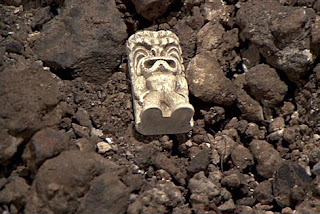Spanish Word of the Day
| April 28th, 2014 at 8:29:27 AM permalink | |
| Pacomartin Member since: Oct 24, 2012 Threads: 1068 Posts: 12569 | I thought that word looked familiar. From last November it was used in an example.
Etymologist do believe that the word originated from the sound an ox makes, but it was thousands of years ago when Proto Indo European (PIE) was spoken. Latin bos "ox, cow" from PIE *gwous- (see cow). Remember that Latin nouns had multiple endings. The English word "cow" comes from the same PIE word, but the English word "bovine" comes from the Latin word. Number Singular Plural nominative bōs bovēs genitive bovis boum dative bovī bōbus/būbus accusative bovem bovēs ablative bove bōbus/būbus vocative bōs bovēs |
| April 30th, 2014 at 9:26:42 AM permalink | |
| Wizard Administrator Member since: Oct 23, 2012 Threads: 239 Posts: 6095 | Fecha: 30-4-14 Palabra: Punzar Today's SWD means to punch. A related word is puñetazo, which means a punch (noun). Interesting how the n chances to ñ when going from the verb to noun. The assignment for the advanced readers is to find and explain the meaning and etymology of the prefix "pun." Ejemplo time. Quiero que me punzas como duro que puedes. = I want you to hit me as hard as you can. Trivia time! What movie is the above quote from? As always, no searching. Knowledge is Good -- Emil Faber |
| April 30th, 2014 at 10:26:18 AM permalink | |
| Pacomartin Member since: Oct 24, 2012 Threads: 1068 Posts: 12569 |
The root word is Spanish puño (fist) from Latin "pugnus" (also fist) where we get the seldom used English word "pugnacious" (adjective meaning "fond of fighting"). The letter ñ was at the origins of Spanish just short hand for two n's when transcribing Latin words (like Latin annus became Spanish año). The letter eventually evolved into a unique Spanish consonant. It appears to me that ñ is always followed by a vowel. As it was mostly derived from Latin words with a double 'n', then it would be pretty hard to imagine it being followed by a third consonant. In the example, the verb has a consonant following the n, while the noun is followed by a vowel. |
| April 30th, 2014 at 11:13:40 PM permalink | |
| Nareed Member since: Oct 24, 2012 Threads: 346 Posts: 12545 | I thought punzar means to stab or to forcibly penetrate something. I've never seen it used to mean "golpear" which does mean to hit someone or to throw a punch. Anyway, does "puño"ultimately descend from the Greek "phalanx"? FYI it means "fist" and it's also the name of a popular military formation in antiquity. The Romans adopted it early and eventually refined it into the "maniple(sp?)" which means hand. Donald Trump is a one-term LOSER |
| April 30th, 2014 at 11:27:39 PM permalink | |
| Pacomartin Member since: Oct 24, 2012 Threads: 1068 Posts: 12569 |
The word "puño" ultimately descends from the Greek πυγμή or "pygmē" (fist). In English "phalanx" means the military formation, but it is related to "phalange" (bone of the finger or toe). |
| May 1st, 2014 at 3:33:27 AM permalink | |
| Wizard Administrator Member since: Oct 23, 2012 Threads: 239 Posts: 6095 |
According to SpanishDice.com, it can mean both. punzar[poon-tharí] article & verb transitive 1. To punch, to bore or perforate. 2. To prick (pinchar), to wound. 3. To sting, to cause pain (dolor). 4. To sting or afflict the mind. Knowledge is Good -- Emil Faber |
| May 1st, 2014 at 3:50:04 AM permalink | |
| Wizard Administrator Member since: Oct 23, 2012 Threads: 239 Posts: 6095 | ¡Feliz día de los trabajodores (MX) todos! Fecha: 1-5-14 Palabra: Codazo Today's SWD means nudge/poke. The assignment for the advanced readers is to confirm or deny a common etymology with codo (elbow). If the answer is yes, does that imply a codozo must come from the elbow? Ejemplo time. El Capitan da un codazo a Gilligan para despertalo. = The Skipper gave Gilligan a poke to wake him up. Knowledge is Good -- Emil Faber |
| May 1st, 2014 at 3:53:22 AM permalink | |
| Pacomartin Member since: Oct 24, 2012 Threads: 1068 Posts: 12569 |
Of course the English verb punch has a double meaning. The meaning "to thrust, prod, to drive (cattle, etc.) by poking and prodding," late 1300's. The specialized sense "to hit with the fist" first recorded 1520s. Googling the verb "punzar" does not turn up any images of someone being hit with a fist. Also the lead definition in DRAE is " herir con un objeto puntiagudo". |
| May 2nd, 2014 at 8:54:55 AM permalink | |
| Wizard Administrator Member since: Oct 23, 2012 Threads: 239 Posts: 6095 | Fecha: 2-5-14 Palabra: Augurio Today's SWD means omen/prediction. The assignment for the advanced readers is to confirm or deny a common etymology with Augusto (August). Ejemplo time. La estatua de Roberto es un augurio malo. = Bobby's statue is a bad omen.   Knowledge is Good -- Emil Faber |
| May 2nd, 2014 at 12:03:17 PM permalink | |
| Pacomartin Member since: Oct 24, 2012 Threads: 1068 Posts: 12569 | The English cognates are: Noun augur - A person or diviner who foretells events. (plural augurs) Noun augury - An omen or prediction. (plural auguries) Verb augur - To foretell events. (conjugations "augurs", "auguring", "augured")  |

